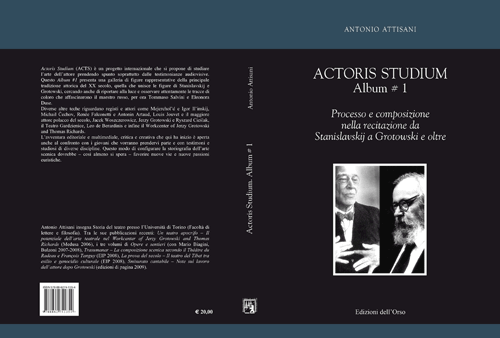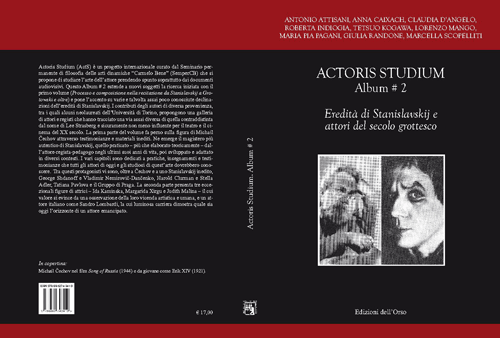Essays Current Research ReviewsContributorsAnnouncements
Home
Actoris Studium (ACTS)
by Maria Pia Pagani, the University of Pavia, Italy
Actoris Studium (ACTS) is an international project begun 2007, created and directed by Antonio Attisani, Professor of Theatre History at University of Turin. Its aim is the collection and the scientific analyses of the art of the actor, using audio-visual documents and considering their importance for a “new” comprehension of the theatre in twentieth century.
By using recordings of performances we can see the elements of the cultural heritage of the past, but also new developmental forms of expression from the performers. Theatre is always a new “invention”, a continuing redevelopment or indeed a kind of renovation for actors and spectators and such access to theatre performance history allows us a unique insight into the assessment of specific performances for theatrical interpretation. The audio-visual documents collected are very precious fragments: and studying them helps us to better understand performance styles of the past, while also offering new source material to the contemporary theatre critic.
The project is international in scope and includes Western and Eastern Europe, and America. Its starting point is turn-of-the-century theatre: the preserved materials about practitioners such as Tommaso Salvini, Konstantin Stanislavsky, Vsevolod Meyerhold are clear proof of their creative experiments, and hold unique insights for the future generations
The project considers also the materials about Eleonora Duse and other famous Italian actors (e.g. Giovanni Grasso), and especially considers their influence on Stanislavsky. There is a special a special focus on audio-visual materials about Michael Chekhov, Antonin Artaud, Louis Jouvet, Tatiana Pavlova, Stella Adler, Judith Malina, Jerzy Grotowski and his Workcenter, Carmelo Bene, Leo de Berardinis, Sandro Lombardi and other significant artists. In fact, some of them – especially in the second half of the twentieth century – used the audio-visual resources as instruments of creative research and expression.
Moreover, the project considers the problem of the “heritage”: a problem which is artistic, but also human and spiritual, and is a key moment in turn-of-the-century theatre. In fact, Stanislavsky understood that he couldn’t transmit all his entire system: transmission is not a cloning process, and the transference of the system in its accurate form depends also upon the willingness of the student to be properly trained
The study of Stanislavsky’s “filiation” focalises all the means of transmission (and new-elaboration) of his “sons” in the theatre twentieth century: America and Western Europe (e.g. London, Berlin, Paris, Prague) are the most important areas for the development of this process. In this context, audio-visual documents testify that the heritage of transmission of Stanislavsky’s work is a form of invention of theatre practice in its own right.
Actually, the specific results of the international project Actoris Studium (ACTS) are the construction of a website and a collection of volumes:
- Antonio Attisani, Actoris Studium – Album # 1 – Processo e composizione nella recitazione da Stanislavskij a Grotowski e oltre, Alessandria, Edizioni dell’Orso, 2009.
 This Album presents a gallery of representative figures of the main theatre tradition of the twentieth century, begun with Stanislavsky and developed by Grotowski. It also aims to observe carefully the traces of the Italian actors who fascinated the Russian master, in particular Salvini and Duse. Other discussions concern directors and actors such as Meyerhold and Igor Ilyinsky, Michael Chekhov, Renée Falconetti and Antonin Artaud, Louis Jouvet, Jacek Woszczerowicz and Ryszard Cieslak, Gardzienice Theatre, Leo de Berardinis, the Workcenter of Jerzy Grotowski and Thomas Richards.
This Album presents a gallery of representative figures of the main theatre tradition of the twentieth century, begun with Stanislavsky and developed by Grotowski. It also aims to observe carefully the traces of the Italian actors who fascinated the Russian master, in particular Salvini and Duse. Other discussions concern directors and actors such as Meyerhold and Igor Ilyinsky, Michael Chekhov, Renée Falconetti and Antonin Artaud, Louis Jouvet, Jacek Woszczerowicz and Ryszard Cieslak, Gardzienice Theatre, Leo de Berardinis, the Workcenter of Jerzy Grotowski and Thomas Richards.
- Antonio Attisani et al., Actoris Studium – Album # 2 – Eredità di Stanislavskij e attori del secolo grottesco, Alessandria, Edizioni dell’Orso, 2012.
 (Essays by A. Attisani – A. Caixach – C. D’Angelo – R. Indiogia – T. Kogawa – L. Mango – M. P. Pagani – G. Randone – M. Scopelliti)
(Essays by A. Attisani – A. Caixach – C. D’Angelo – R. Indiogia – T. Kogawa – L. Mango – M. P. Pagani – G. Randone – M. Scopelliti)
This Album presents various and sometimes little-known aspects of Stanislavsky’s “heritage”. There are new materials about Michael Chekhov, useful to help u understand the teaching of the last years of the Russian master, and many documents about the artistic experiences of George Zhdanoff and Vladimir Nemirovich-Danchenko, Harold Clurman and Stella Adler, Tatiana Pavlova and the Group of Prague. There is also a gallery with the portraits of important actors such as Ida Kaminska, Margarida Xirgu, Judith Malina, Sandro Lombardi and reflections about their emblematic career. This volume is dedicated to the memory of Lisa Wolford Wylam (1964-2011).
Information about the founder of ACTS
Antonio Attisani is Professor of Theatre History at University of Turin. He attended the prestigious School of Piccolo Teatro in Milan, and worked also as professional actor, critic, festival director. He is author of appreciated books and essays about recitation and theatre in Western and Eastern traditions: Teatro come differenza (1978 and 1988), Oltre la scena occidente (1995 and 1999), L’invenzione del teatro: fenomenologie e attori della ricerca (2003). His other research interests include Tibetan Theatre: Il teatro del Tibet (1993), Fiabe teatrali del Tibet (1996), A ce lha mo: studio sulle forme della teatralità tibetana (2001). He is one of the greatest Italian examiners of Jerzy Grotowski: Un teatro apocrifo: il potenziale dell’arte teatrale nel Workcenter of Jerzy Grotowski and Thomas Richards (2006), Smisurato cantabile: note sul lavoro del teatro dopo Jerzy Grotowski (2009), I sensi di un teatro (2011). He edited Enciclopedia del teatro del ’900 (1980), Il sipario dell’anima: dialogando con Pirandello (with Riccardo Bonacina, 1986), Twentieth-century drama: an anthology – The first fifty years (with Jane House, Columbia University Press, 1995), Bene crudele: cattivario di Carmelo Bene (with Marco Dotti, 2004), Umberto Artioli & Carmelo Bene’s Un dio assente: monologo a due voci sul teatro (with Marco Dotti, 2006), Grotowski’s collection Opere e sentieri (with Mario Biagini, 3 volumes, 2007-2008). He wrote the preface to the Italian edition of the volume Pazzi di Artaud (2006) by Sylvère Lotringer. He is the director of the scientific project Actoris Studium (ACTS), for whom published the volume Actoris Studium – Album # 1 – Processo e composizione nella recitazione da Stanislavskij a Grotowski e oltre (2009).
Personal page in www.academia.edu
Mail: Antonio.attisani@unito.it
Images are reproduced with permission of Professor Antonio Attisani, the University of Turin.